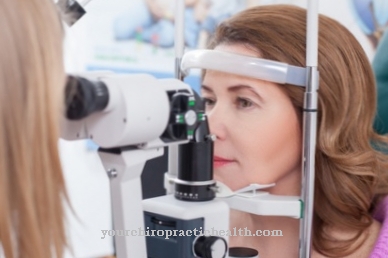Under Immune modulation a partial reorientation of the immune responses of the immune system is understood. Immune modulation can, especially in the case of excessive allergic reactions and autoimmune reactions directed against one's own tissue, help to contain the undesirable and harmful immune responses and to stimulate the desired and vital reactions. Immune modulations can be achieved through chemical substances and targeted "training" of the immune system.
What is Immunomodulation?

Reactions of the immune system to certain stimuli such as chemical substances, bacterial or viral pathogens or to degenerate body's own cells can be triggered by the innate, genetically determined, or by the adaptive, learned, immune defense.
The immune system embodies an extremely complex system of reaction options to ward off germs and harmful substances. This also includes the detection and destruction of the body's own degenerate tumor cells. The immune responses to certain stimuli depend on many different factors, including the strength of the immune system and its alignment.
The many challenges the immune system has to face can suddenly or gradually lead to undesirable and harmful immune responses. Typically, in this context, allergic overreactions to certain “allergens” or autoimmune reactions should be mentioned, which manifest themselves in an attack on the body's own tissue.
In order to avoid harmful reactions, which in serious cases can be life-threatening, the immune system is either suppressed (suppression) or an attempt is made to modulate the immune system, i.e. to change its specific reactions to certain stimuli. For example, the desensitization of the immune system to certain allergens corresponds to an immune modulation.
Function, effect & goals
Immune responses to invading pathological germs arise from an extremely complex interaction of the individual components of the immune system.
In the case of initial infections, the innate - less specific - immune system with its natural killer cells (NK cells) jumps in, and the adaptive immune system develops an absolutely specific defense, the "program" of which is retained after the infection has been overcome in the form of memory cells with corresponding antigens so that the immune system can react more quickly if the infection occurs again and immunity is established. The adjustment of the immune system to specific pathogens corresponds to the body's own immune modulation, because the adaptive or acquired immune system is "modulated" via a kind of self-regulation for an extended reaction. The modulation takes place via a complex interaction of different components of the immune system.
The detection of harmful bacteria and the detection of own body cells infected with viruses takes place via a negative selection. Cells and bacteria infected with viruses usually lack a certain marker on their surface. They lack the ID, so to speak, by which the immune system would recognize that these are the body's own cells. A similar process occurs when the immune system no longer recognizes aged or degenerate tumorous cells as endogenous and therefore phagocytoses them and breaks them down into their components in order to release parts of them for recycling in the body's own metabolism and the remaining components via the kidneys or liver to dispose.
Not only pathogenic bacteria or viruses can trigger immune reactions, but also certain substances - mostly biologically active substances such as pollen, certain aerosols or toxic substances that can penetrate the body in various ways, for example via the respiratory tract. In these cases, too, the immune system reacts with phagocytosis. This means that specialized lymphocytes absorb the substances, render them harmless and carry them away. In allergy sufferers, their immune system reacts too strongly to such chemical stimuli (allergens). The immune system produces larger amounts of histamines and thus attracts more specialized lymphocytes. A kind of inflammatory reaction develops, which can lead to asthma attacks and other serious health problems.
In order not only to treat the problem symptomatically, but to combat the cause, an attempt must be made to re-modulate the immune system via the process of desensitization, so that the allergic reactions weaken or even fail completely. Another problem can be autoimmune reactions of the immune system. In these cases, cells of a certain body tissue are no longer recognized as the body's own and are attacked.Well-known diseases that are based on autoimmune reactions include multiple sclerosis (MS), in which the immune system attacks its own nervous system, and rheumatoid arthritis. Hashimoto's thyroiditis is an autoimmune disease of the thyroid gland.
The exact causes of autoimmune diseases are not (yet) sufficiently known. In addition to a certain genetic disposition, causes are also discussed in the case of an insufficiently “trained” immune system, so that immune training with intended immune modulation could even combat autoimmune diseases. Immune modulations can be achieved through “training” the immune system and exposure to certain stimulants that provoke immune responses, but also through relaxation exercises and saunas. In naturopathy, some phytochemicals are ascribed the ability to immunomodulate.
You can find your medication here
➔ Medicines to strengthen the defense and immune systemRisks, side effects & dangers
There are no known direct risks and dangers associated with general immune training or immune modulation. If immunomodulations are supported by extracts obtained from medicinal plants, a certain degree of caution is advisable.
For example, ingredients in red coneflowers are considered to be immunomodulating. The ingredients of the hemp plant (cannabis) are said to have similar effects. One of the greatest “dangers” of immunomodulation is that, in the worst case, the goal of improving allergic reactions or curbing autoimmune reactions is not achieved. If specific goals associated with immune training are not achieved, a strengthening of the immune system can be expected at least as a positive side effect, which should be expressed in a reduced susceptibility to infections and colds.













.jpg)

.jpg)
.jpg)











.jpg)